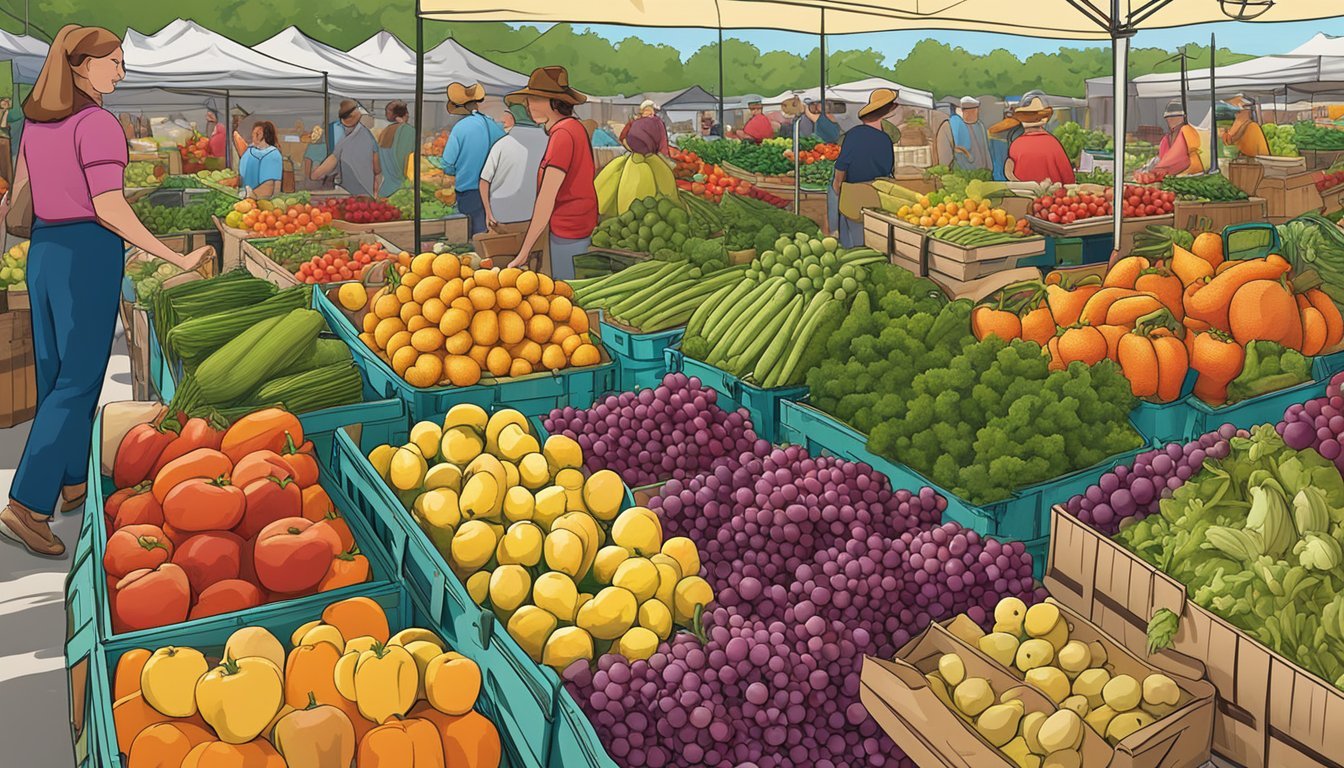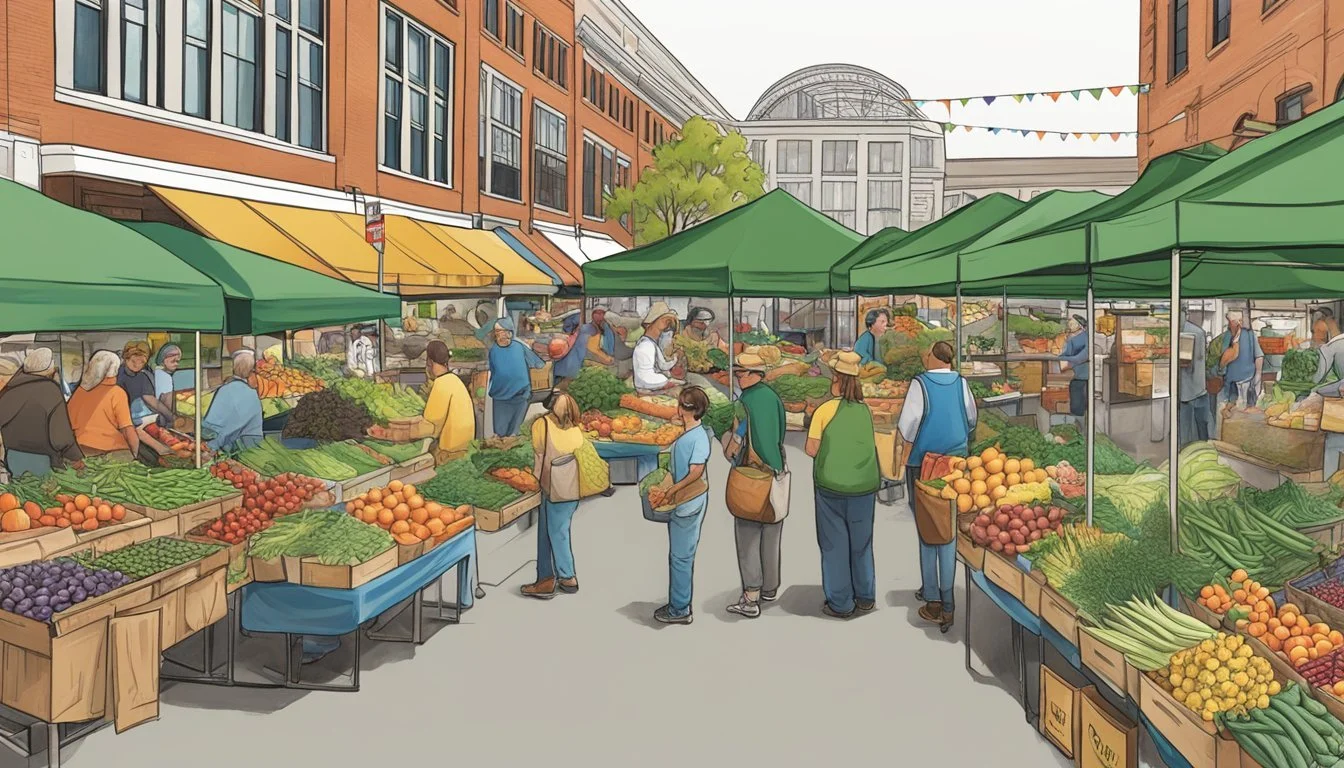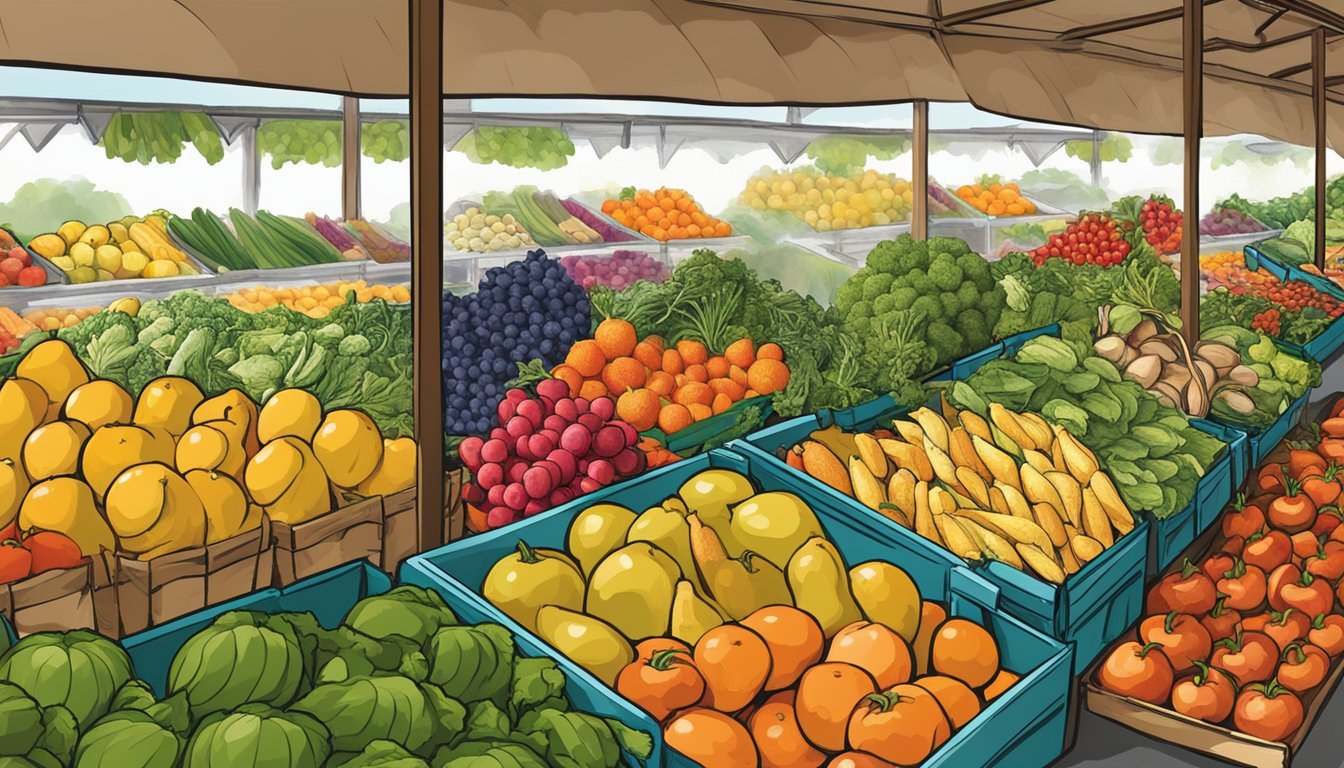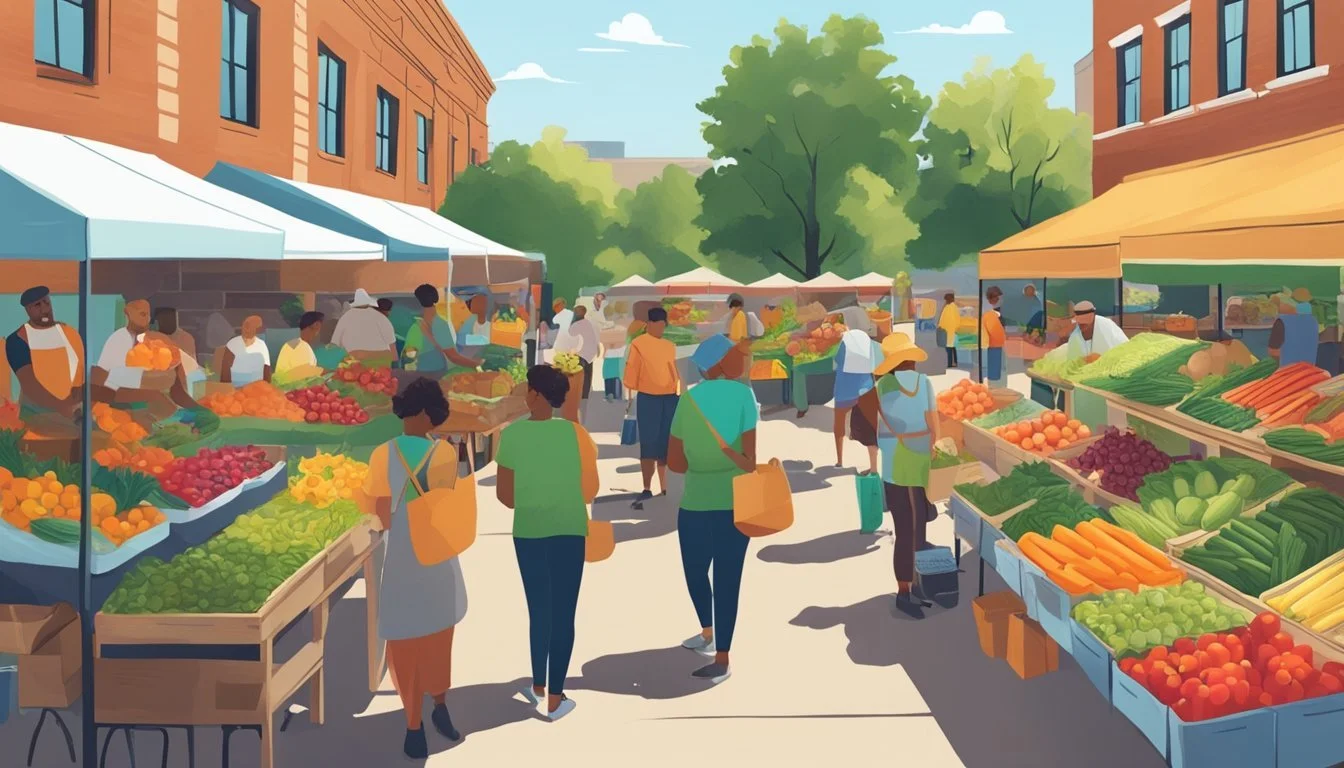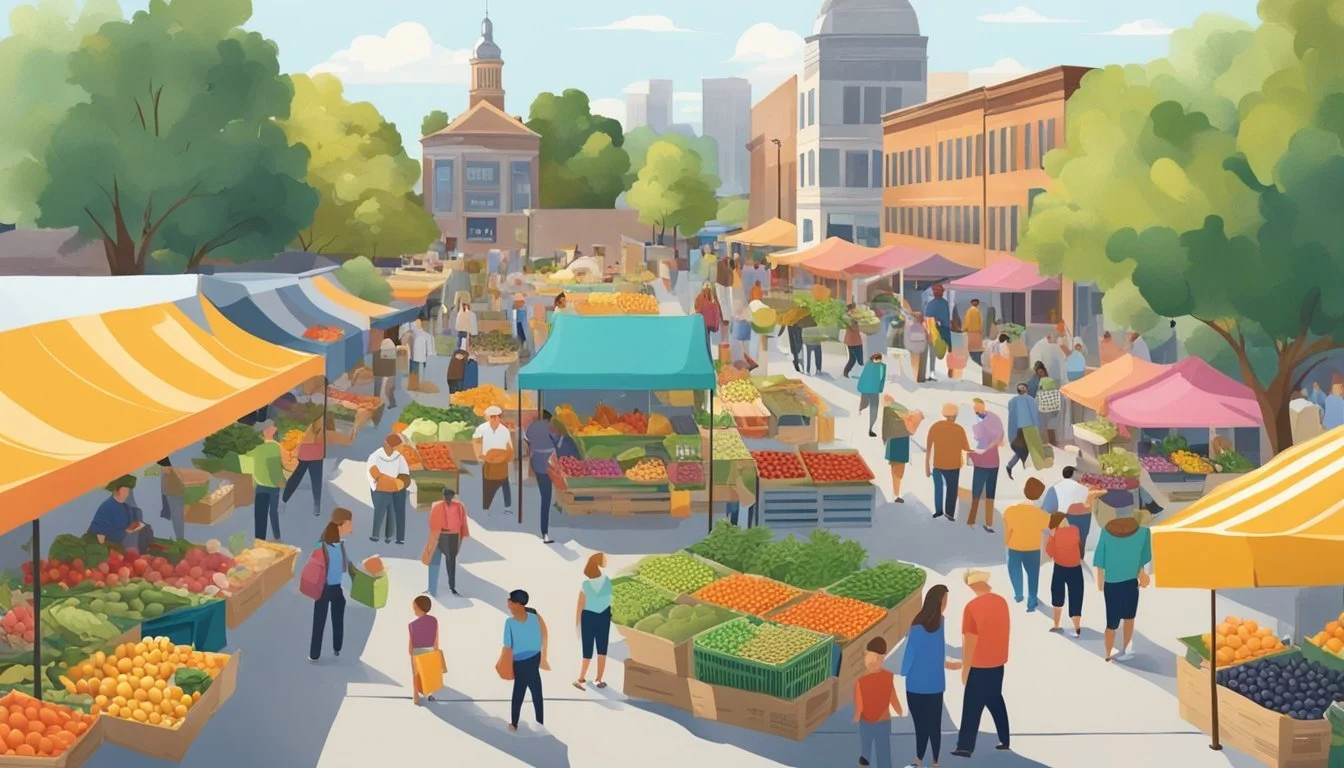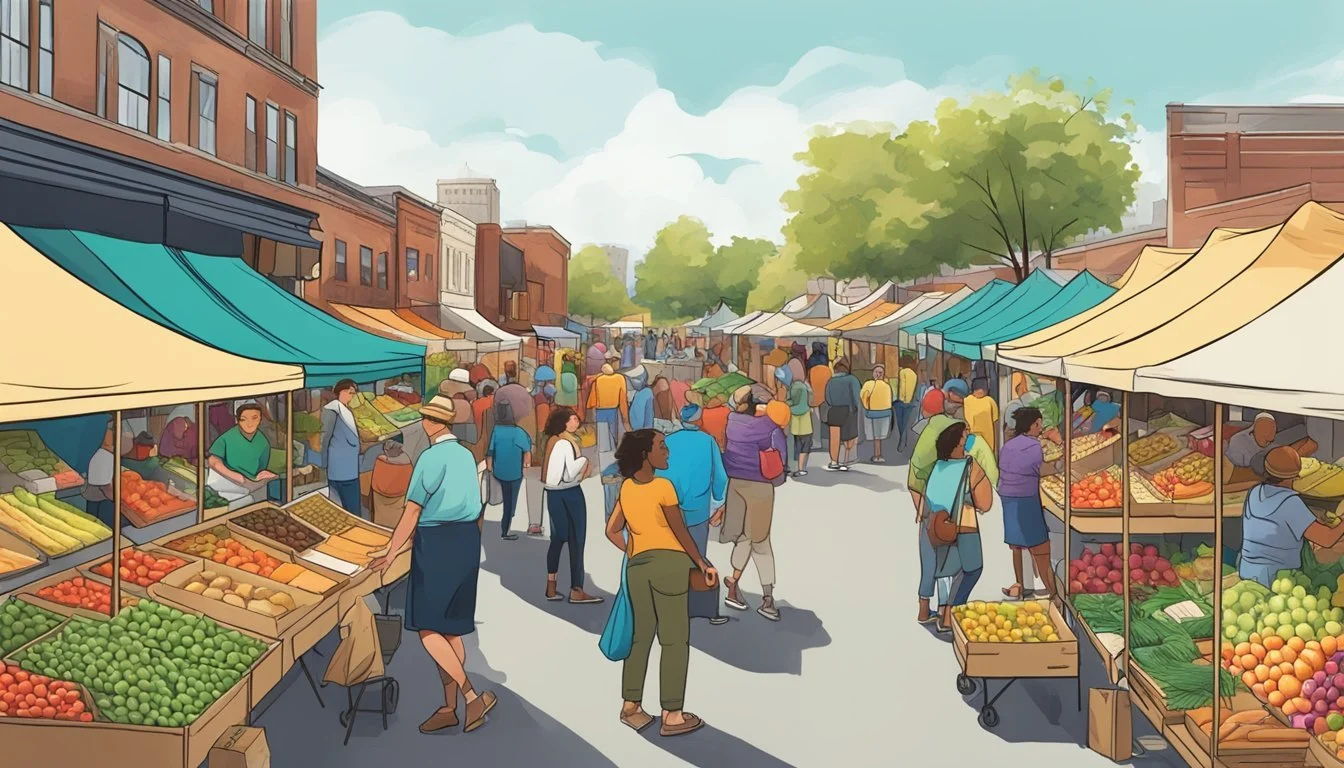Community Supported Agriculture (CSA) in Des Moines, IA
A Guide to Local Farm Partnerships
Community Supported Agriculture, commonly known as CSA, represents a growing movement within the Des Moines, IA, area that focuses on forming a direct bond between local farmers and consumers. This innovative model allows residents of Des Moines to subscribe to the harvest of a particular farm or group of farms, receiving weekly or bi-weekly shares of fresh produce throughout the farming season. The CSA model not only provides households with fresh, locally-grown fruits and vegetables, but also supports local agriculture by ensuring farmers have a steady market for their crops.
The landscape of CSA in Des Moines is rich and varied. Small scale urban farms and larger agricultural operations coexist, offering a range of options for individuals interested in joining a CSA program. Farms like 53rd St. Potager emphasize the delivery of seasonal fresh produce with a focus on heirloom and French varieties, tailored to sustain a modest number of families. Moreover, initiatives like the Global Greens program assist former refugees in starting their own farming businesses, following organic practices to contribute to the CSA market. This collaborative approach enhances the city's food security and promotes sustainable farming methods.
The impact of CSA in Des Moines extends beyond the dining table. It fosters community engagement by creating connections between urban dwellers and farmers. Members have the opportunity to learn more about where their food comes from, the challenges of farming, and the benefits of eating seasonally. Additionally, the CSA model encourages ecologically sound farming practices as many participating farms in the Des Moines area adopt organic or Certified Naturally Grown standards. Through CSA, both producers and consumers in Des Moines are forging a sustainable future, one harvest at a time.
Understanding CSA
Community Supported Agriculture is a model that connects consumers directly with local producers. Participants buy into the program, known as purchasing "shares," which entitles them to a portion of the harvest throughout the growing season.
History of CSA
Community Supported Agriculture (CSA) began in the 1960s in Germany, Switzerland, and Japan as a response to concerns about food safety and the urbanization of agricultural land. It arrived in the United States in the 1980s and has since gained popularity as a sustainable alternative to conventional food systems. In Des Moines, IA, CSA programs have provided an opportunity for local farmers to collaborate with urban communities, building stronger food networks and offering residents access to fresh locally grown produce.
CSA Model and Practices
The CSA model is founded on a partnership between farmers and consumers. Consumers purchase a share of the harvest in advance, which provides the farmer with initial capital for crop production. In return, share members receive regular distributions of the farm's yield throughout the agricultural season.
Share Types: Typically, shares include a variety of vegetables and may also offer fruits, eggs, and other farm products.
Distribution Methods: Members either pick up their shares at designated locations or have them delivered, depending on the farm's practice.
Agricultural Practices: Many CSA farms employ organic or biodynamic farming methods, focusing on ecological balance and soil health. For instance, the Global Greens program in Des Moines helps former refugees grow produce organically for their CSA programs.
The success of a CSA depends on the mutual commitment between the farmer and the consumer. It allows local agriculture to thrive by ensuring financial support for farmers and provides consumers with fresh, homegrown food.
CSA Benefits
Community Supported Agriculture (CSA) programs in Des Moines, IA, offer tangible benefits for both farmers and consumers. These programs foster a direct partnership between local farms and community members, enhancing the local economy and promoting health and wellness through access to fresh, healthy produce.
Advantages for Farmers
Financial Stability: Farmers gain economic support through CSA memberships, which provide upfront seasonal funding from consumers. This financial model helps stabilize farm income and can cover the initial operational costs at the start of the growing season.
Community Connection: CSAs allow farmers to build personal relationships with their consumers, increasing understanding and appreciation for the farming process within the community. This can lead to a loyal customer base and word-of-mouth marketing.
Advantages for Consumers
Access to Fresh Produce: Consumers receive a share of seasonal, freshly-harvested produce, which often includes a variety of heirloom and French varieties. This direct access supports consumers' health with nutrient-rich foods.
Education and Involvement: Joining a CSA educates consumers about seasonal eating and fosters a stronger connection to the source of their food. Members may also have opportunities to visit farms and participate in food growing, which deepens their understanding of sustainable agriculture.
Local CSAs in Des Moines
Des Moines, IA, boasts a variety of Community Supported Agriculture (CSA) programs that foster a connection between local consumers and the food they eat. These programs offer Des Moines residents the opportunity to directly support local farms.
West Des Moines CSA Examples
In West Des Moines, individuals seeking fresh, heirloom, and French variety produce can turn to 53rd St. Potager. With a focus on small-scale urban farming, 53rd St. Potager's aim is to support 10-15 families on less than half an acre.
Grade A Gardens, another significant contributor to the West Des Moines area, operates on a larger scale. Farmers Jordan and Whitney Clasen cultivate regenerative fruits and vegetables across 25 acres in Earlham. They are passionate about supplying the community with fresh local food and support approximately 100 families through their CSA program.
Ames and Ankeny CSA Profiles
Moving north of Des Moines to the Ames and Ankeny region, local residents can access various CSA options.
Wild Woods Farm in Solon, not very far from Ames and Ankeny, offers CSA shares featuring a range of produce. They are known for their commitment to sustainable farming practices.
Bountiful Harvest Farm connects the communities of Ames and Ankeny to Solon and Iowa City, extending access to their fresh produce through CSA shares.
These Community Supported Agriculture programs not only provide locals with fresh, seasonal produce but also strengthen the bonds between the consumers and the stewards of the land.
Seasonal Offerings
Community Supported Agriculture in Des Moines, IA offers a plethora of fresh, locally-grown produce that varies by the season. Subscribers can expect a diverse range of vegetables and, in some cases, eggs, reflecting the region's rich agricultural tapestry.
Summer Shares
During the summer months, CSA shares burst with a variety of vegetables. Members might see an array of:
Tomatoes - heirloom and French varieties
Leafy Greens - including kale and spinach
Root Vegetables - like carrots and beets
Summer Squash and zucchini
Some CSAs provide egg options with their summer shares, offering a weekly supply sourced from local farms.
Winter Availability
Winter shares, while sometimes more limited, still provide hearty vegetables that can withstand the cold Iowa temperatures. Subscribers can anticipate vegetables such as:
Potatoes and Sweet Potatoes
Onions
Storage crops like beets and carrots
Wintertime CSA offerings may not be as diverse, but they ensure a steady supply of nutritious vegetables during the colder months. Some CSAs might offer preserves or stored produce to extend the taste of summer into winter.
Specialty CSA Products
Community Supported Agriculture in Des Moines, IA offers a variety of specialty products, including pastured meats and heirloom produce. These products reflect a commitment to sustainable, organic practices and provide unique options for consumers interested in supporting local agriculture.
Pastured Meat and Poultry
Pastured meat and poultry offer consumers in Des Moines options beyond traditional grocery store fare. Animals raised on pasture enjoy a diet that allows them to roam and consume a natural diet. This results in meat and poultry that are not only flavorful but also align with high ethical and health standards. Local CSAs provide a variety of pastured products such as beef, pork, chicken, and sometimes even lamb, connecting consumers with high-quality, locally-sourced meats.
Organic and Heirloom Produce
Organic and heirloom produce stand out for their environmentally friendly cultivation practices and genetic diversity. Des Moines' CSAs pride themselves on offering a selection of organic fruits and vegetables, grown without synthetic pesticides or fertilizers. Heirloom varieties, cherished for their unique flavors and historical significance, offer an additional layer of variety. These specialty crops include a range of heirloom vegetables, orchard fruits, and berries, with the additional benefit of occasional add-on items like organic eggs.
Sustainability and Farming Methods
In Des Moines, IA, Community Supported Agriculture (CSA) farms employ methods focusing on sustainability and responsible farming practices. They prioritize chemical-free and Certified Naturally Grown standards to foster environmental health and produce nutritious food.
Chemical-Free Farming
CSA farms in Des Moines opt for chemical-free farming to maintain soil health and biodiversity. These farms avoid synthetic pesticides and fertilizers, which benefits not only the ecosystem but also ensures that members receive fresh produce without chemical residues. For example, 53rd St. Potager is a small urban CSA farm that supports its community with heirloom and French variety produce grown without harmful chemicals.
Certified Naturally Grown Practices
A step parallel to organic certification, Certified Naturally Grown (CNG) practices are common among Des Moines CSAs. Farms with CNG status adhere to strict guidelines that include but are not limited to:
Crop Rotation and Cover Cropping: This maintains soil fertility and prevents weed and pest cycles.
Composting: Nutrient-rich compost nourishes the soil naturally.
Conservation Tillage: Reducing tillage preserves soil structure and water.
CSAs like Grade A Gardens successfully implement these practices, demonstrating a commitment to sustainable and responsible agriculture that aligns with community and environmental welfare.
Additional CSA Services
Community Supported Agriculture in Des Moines offers a variety of services to meet the diverse needs of its members. Convenience and accessibility are prioritized through home delivery options and strategic pick-up locations.
Home Delivery Options
Several CSAs in Des Moines understand the importance of convenience and offer home delivery services. This ensures that members who may not have the time or ability to travel to pick-up points can still enjoy fresh, local produce. Home delivery also helps in reducing the carbon footprint by limiting individual trips to the farm or market.
Pick-up Locations and Market Partnerships
For those who prefer to receive their shares through a community-based approach, CSAs have established multiple pick-up locations across the area. Working closely with local markets, these pick-up points are often situated at easily accessible sites such as neighborhood stores, farmers' markets, and sometimes even at the farm itself. These partnerships not only foster a sense of community but also support the local food economy.
Convenient pick-up locations include:
Neighborhood stores
Farmers' markets
Designated community spots
Markets serve as a nexus for local food distribution, and CSA partnerships leverage this network for mutual benefit. The synergy between CSA programs and market partnerships underscores the shared commitment to sustainable, community-supported local food systems.
Community and CSA
In Des Moines, IA, Community Supported Agriculture bridges the gap between consumers and producers by fostering a partnership that benefits both the community and local farmers, including refugees, while promoting education regarding agriculture.
Supporting Local Farmers and Refugees
Community Supported Agriculture (CSA) programs in Des Moines not only contribute to the local economy but also empower refugee farmers. For instance, Global Greens is a program that aids former refugees who are starting their own farming businesses. CSA members receive vegetables grown following organic practices from these refugees, thus enabling a stable income for them and providing fresh locally-grown produce to the community.
Educational Opportunities
CSAs in Des Moines offer invaluable educational opportunities to the community. Through CSA participation, members learn directly about local food production, sustainable farming practices, and the seasonality of crops. Farms like 53rd St. Potager prioritize small-scale urban farming education, focusing on heirloom and French varieties, which illustrates a commitment to both agricultural diversity and community enlightenment.
Joining a CSA
Community Supported Agriculture (CSA) in Des Moines, IA, offers consumers a means to purchase seasonal food directly from local producers. When joining a CSA, individuals secure a share of the harvest, ensuring a steady supply of fresh produce and, in some cases, additional farm products.
Choosing the Right CSA
When considering a CSA, one should evaluate the variety of produce offered, the farming practices utilized, such as organic or Certified Naturally Grown, and the convenience of pick-up locations or delivery options. Many CSAs in Des Moines are differentiated by their unique offerings, like specialty heirloom vegetables or the inclusion of eggs and other products. For example, some CSA options that serve the Des Moines area include:
Echollective CSA: Offers fresh produce in Cedar Rapids and Iowa City areas.
Wild Woods Farm: Known for providing fresh seasonal produce to Iowa City, Solon, and surrounding areas.
Bountiful Harvest Farm: Offers a variety of fresh goods, including in areas of Solon, Iowa City, and North Liberty.
Prospective CSA members should contact farms directly to understand what is available in a typical share and learn about the farmers' practices.
Subscription Process
Joining a CSA generally involves the following steps:
Research and Contact: Prospective members research CSAs available in the area and contact their chosen farm for detailed membership information.
Subscription Agreement: Individuals then review and accept the subscription agreement, which outlines the terms of membership and share of the produce.
Payment: Members pay for their CSA share in advance of the growing season. This upfront investment supports farm operations early in the season when they need it most.
Receiving Shares: Once the growing season begins, members receive their allotted shares of the harvest. Distribution is typically conducted weekly or bi-weekly at designated drop-off points or via home delivery.
For detailed information, consumers are encouraged to visit CSA farm websites or contact them directly, as the subscription process might vary slightly between different CSAs.
Participants' Experiences
In Des Moines, IA, participants in Community Supported Agriculture (CSA) programs share a connection to their food source that fosters community and health benefits.
Testimonials
Jacob H. from Des Moines says, “Being part of a CSA has changed the way I think about food. I love that the produce is not only local but also fresher and more flavorful than what I find in supermarkets.”
Samantha T. of West Des Moines shares, “My family's health has improved with the variety of veggies we get. The kids are even excited about kale now!”
Case Studies
53rd St. Potager: A CSA that operates on less than half an acre, providing seasonal produce to 10-15 families. Members value the emphasis on heirloom and French varieties of produce, noting the exceptional taste and quality.
Grade A Gardens: Jordan and Whitney Clasen run this 25-acre farm in Earlham, serving 100 families in the area. They report that customers appreciate their commitment to regenerative farming practices, and the significant positive impact on local soil health.
Local Agricultural Landscape
Community Supported Agriculture programs in Des Moines, Iowa are integral to the state's agribusiness. They create a symbiotic relationship between consumers and producers, bolstering the local food economy and supporting small-scale agriculture.
Role of CSAs in Iowa Agribusiness
In the agribusiness landscape of Iowa, CSAs play a substantial role in connecting farmers with local consumers. These programs allow residents to buy shares of a farm's harvest in advance, creating a direct line of support for farmers while providing consumers with fresh, locally-grown produce. CSAs help to stabilize farm income and reduce the financial risks associated with farming. They also foster an agricultural community that values sustainability, fresh produce, and the economy of local food systems.
The contributions of CSAs to Iowa's agriculture can be summarized through key points:
Advance Shares: Customers pay for produce upfront, which gives farmers an early-season cash flow.
Community Engagement: CSAs often hold events which further strengthen community-farmer connections.
Impact on Small Farming Businesses
Small farming businesses in Iowa often rely on CSAs to navigate the competitive agricultural market. By providing a guaranteed market for their products, CSAs alleviate some of the marketing and sales pressures that small scale farmers face. This has a direct impact on a small farm's viability, allowing them to focus more on sustainable farming practices and less on the volatility of market prices.
Key impacts on small farming businesses include:
Financial Security: CSAs provide farmers with a more predictable income, reducing the uncertainty that can hinder the growth of small farming businesses.
Market Access: CSAs can offer more consistent market access for small farmers, who may struggle to compete with larger agricultural businesses in traditional markets.




